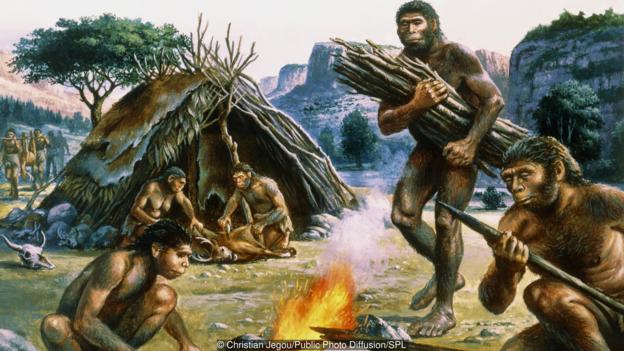At some point in history there had to be one initial crucial step that separated humans from the other animals in our journey to becoming the dominant species on this planet. I will call that point the beginning of science and label it by humans ability to control fire. The ability to control fire was a turning point in human evolution.
The Benefits of Controlling Fire

Sometime in our ancestor’s very ancient past, and certainly by 400,000 years ago, fire came under human control. By this time the archeological record is full of heat altered artifacts. Control of fire in human evolution was beneficial for a variety of novel reasons. These benefits include:
- Provided protection from predators and assisted in hunting prey.
- Provided warmth which allowed people to live in cooler regions of the planet
- Assisted in tool making
- Ceremonial usages
- Allowed people to see at night
- Provided us with the ability to cook food
- Provided groups with a “nest” – the campsite
Protection from predators and used in hunting prey
In the struggle for survival, fire was used both defensively and offensively. Fire can be used as a deterrent because it often scares away animals. Additionally, there is evidence that first accidental and then controlled fires were used to scorch large areas of land for food. During the blaze many animals inevitably perished in the inferno. Our early humans ancestors could then walk in and “fire harvest” many of the small animals and eggs for food. These large scale fires would also create chance cooking, a prequel of intentional cooking as it led to the food being more easily digestible. Fires would also cause larger animals to flee out into the open making them easier to kill.
Fire provides warmth
Humans are well adapted to living in warmer climates but are much less well adapted to living in colder regions. The obvious reason is that we have lost much of the hair on our body. Without fur we needed another way to stay warm. Staying close to a fire allows us to survive during cooler nights and in cooler regions during the winter season.

(Credit: Christian Jegou/Public Photo Diffusion/SPL)
Fire assists in tool-making
Fire allowed the forging of tools. The is evidence that Neanderthals used fire in shaping wood tools. Although wood from hundreds of thousands of years ago would not last to the present day it is likely that our ancestors would have done the same. Stone and bones last much longer than wood. There is evidence for deliberate heat altered stone and bone artifacts as far back as 1,000,000 years ago in caves across Africa. The artifacts would have been used for weapons such as a spear, or a digging stick for a food gatherer.
Fire in ceremonial usage
The raw power of fire would have been inspiring to our ancient ancestors. There is evidence that it was used in ceremonials services of sacrifices, offerings, or devotion. We still see candles displayed in many ceremonies today.
Night vision
Controlling fire allowed people to see at night. Being able to see at night adds to the time that people can be productive. It also meant people could travel much more safely at night.
Cooking food
Cooking food may have been a significant step in leading humans to the top of the food chain and even to increasing brain size, although hominid brain size was increasing before cooked food became common in early humans. In any case, what is indisputable is that cooking food killed the parasites that infested food, allowing for easier digestion. This enabled our human ancestors to make due with smaller teeth and shorter intestines. It is hypothesized that a smaller intestine was the factor in allowing for a larger, jumbo brain of sapiens and Neanderthals, since both the brain and the digestive tract are two are the largest energy consuming organ systems in the body. By shortening the digestive tract it enabled the energy economy of the body to devote more resources to a jumbo human brain.
The campsite
The campsite is also believed to have functioned as a “nest” for our ancestors and therefore played a pivotal role in the evolution of our sociability. All animals that exhibit sociability have a nest, which allow for a common place for the species to gather and stay at. Evidence of campsites exists from about 400,000 – 300,000 years ago in varying sizes and contexts.
Control of fire was a turning point in human evolution. The process happened gradually through increasing interaction with natural fires. Accidentally cooked meat provided a new sources of calories and protein that was easily digestible. A fortuitously shaped burnt stone in the shape of a sharp point would have been used for hunting or digging. Eventually our ancestors learned to control fire and made these things deliberately. We used the power of fire to forge the metals that made our tools and building structures. The benefits to our species of fire use cannot be overstated in the physical, social, and cultural realms.
Continue reading more about the exciting history of science!
Wow. I learned something today. Thanks for the info.
Wow! Very interesting! Thank you!
this is so interesting. such a lovely read
Very sweet and informative. that’s a great history. Thanks.
I found your post very informative and interesting. You have gone into detail and done a lot of research. I really appreciate this post thanks
This is so informative. I love to learn new things.
How smart to control the fires to be able to see at night. I love to read facts like these.
This was a great article to read and this should be read also by others not only adults but most especially those students. Thank you for sharing this interesting and informative article with us.
What a great post! I’ve been enjoying reading your thoughts each week. Thank you for sharing!
Such a great and very informative post. So happy to learn new things for today. I found your blog a great resource.
Great and informative! Thank you for sharing!
This is interesting. I really like this kind of information, gonna subscribe to your site.
Very informative post. I like your thoughts and hope to read more post from u
This is so interesting and informative. Thanks!
Growing up in a rural village in Kenya, we used firewood to cook and invented some sort of candle like thing to see. I miss those days and smoked meat was always so delicious.